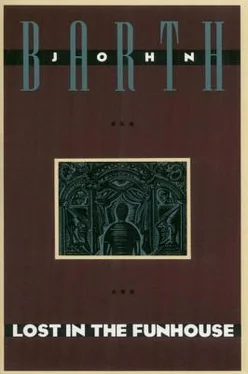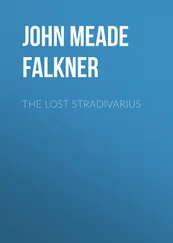John Barth - Lost in the Funhouse
Здесь есть возможность читать онлайн «John Barth - Lost in the Funhouse» весь текст электронной книги совершенно бесплатно (целиком полную версию без сокращений). В некоторых случаях можно слушать аудио, скачать через торрент в формате fb2 и присутствует краткое содержание. Год выпуска: 2014, ISBN: 2014, Издательство: Knopf Doubleday Publishing Group, Жанр: Современная проза, на английском языке. Описание произведения, (предисловие) а так же отзывы посетителей доступны на портале библиотеки ЛибКат.
- Название:Lost in the Funhouse
- Автор:
- Издательство:Knopf Doubleday Publishing Group
- Жанр:
- Год:2014
- ISBN:978-0-8041-5250-1
- Рейтинг книги:3 / 5. Голосов: 1
-
Избранное:Добавить в избранное
- Отзывы:
-
Ваша оценка:
- 60
- 1
- 2
- 3
- 4
- 5
Lost in the Funhouse: краткое содержание, описание и аннотация
Предлагаем к чтению аннотацию, описание, краткое содержание или предисловие (зависит от того, что написал сам автор книги «Lost in the Funhouse»). Если вы не нашли необходимую информацию о книге — напишите в комментариях, мы постараемся отыскать её.
Lost in the Funhouse — читать онлайн бесплатно полную книгу (весь текст) целиком
Ниже представлен текст книги, разбитый по страницам. Система сохранения места последней прочитанной страницы, позволяет с удобством читать онлайн бесплатно книгу «Lost in the Funhouse», без необходимости каждый раз заново искать на чём Вы остановились. Поставьте закладку, и сможете в любой момент перейти на страницу, на которой закончили чтение.
Интервал:
Закладка:
In the lumberyard down past the hospital they used square pine sticks between the layers of drying boards to let air through. The beach was littered with such sticks, three and four and five feet long; if you held one by the back end and threw it like a spear into the water, nothing made a better submarine. Perse Goltz had started launching submarines and following them down toward the Jungle as they floated on the tide.
“Don’t go any farther,” Ambrose said when he drew near.
Perse asked indifferently: “Why don’t you shut up?”
“All I’ve got to do is give the signal,” Ambrose declared, “and they’ll know you’re sneaking up to spy.”
As they talked they launched more submarines. The object was to see how far you could make them go under water before they surfaced: if you launched them too flat they’d skim along the top; if too deeply they’d nose under and slide up backward. But if you did it just right they’d straighten out and glide several yards under water before they came up. Ambrose’s arms were longer and he knew the trick; his went farther than Perse’s.
“There ain’t no sign,” Perse said.
“There is so. Plenty of them.”
“Well, you don’t know none of them, anyhow.”
“That’s what you think. Watch this.” He raised his hand toward the Jungle and made successive gestures with his fingers in the manner of Mister Neal the deaf and dumb eggman. “I told them we were just launching submarines and not to worry.”
“You did not.” But Perse left off his launching for a moment to watch, and moved no farther down the beach.
“Wait a minute.” Ambrose squinted urgently toward the trees. “ Go … up … the … beach. They want us to go on up the beach some more.” He spoke in a matter-of-fact tone, and even though Perse said “What a big fake you are,” he followed Ambrose in the direction of the new bridge.
If Ambrose was the better launcher, Perse was the better bombardier: he could throw higher, farther, straighter. The deep shells they skipped out for Ducks and Drakes; the flat ones they sailed top-up to make them climb, or straight aloft so that they’d cut water without a splash. Beer cans if you threw them with the holes down whistled satisfactorily. They went along launching and bombarding, and then Ambrose saw a perfectly amazing thing. Lying in the seaweed where the tide had left it was a bottle with a note inside.
“Look here!”
He rushed to pick it up. It was a clear glass bottle, a whisky or wine bottle, tightly capped. Dried eelgrass full of sand and tiny musselshells clung round it. The label had been scraped off, all but some white strips where the glue was thickest; the paper inside was folded.
“Gee whiz! ” Perse cried. At once he tried to snatch the bottle away, but Ambrose held it well above his reach.
“Finders keepers!”
In his excitement Perse forgot to be cynical. “Where in the world do you think it come from?”
“Anywhere!” Ambrose’s voice shook. “It could’ve been floating around for years!” He removed the cap and tipped the bottle downward, but the note wouldn’t pass through the neck.
“Get a little stick!”
They cast about for a straight twig, and Ambrose fished into the bottle with it. At each near catch they breathed: “Aw!”
Ambrose’s heart shook. For the moment Scylla and Charybdis, the Occult Order, his brother Peter — all were forgotten. Peggy Robbins, too, though she did not vanish altogether from his mind’s eye, was caught up into the greater vision, vague and splendrous, whereof the sea-wreathed bottle was an emblem. Westward it lay, to westward, where the tide ran from East Dorset. Past the river and the Bay, from continents beyond, this messenger had come. Borne by currents as yet uncharted, nosed by fishes as yet unnamed, it had bobbed for ages beneath strange stars. Then out of the oceans it had strayed; past cape and cove, black can, red nun, the word had wandered willy-nilly to his threshold.
“For pity’s sake bust it!” Perse shouted.
Holding the bottle by the neck Ambrose banged it on a mossed and barnacled brickbat. Not hard enough. His face perspired. On the third swing the bottle smashed and the note fell out.
“I got it!” Perse cried, but before he could snatch it up, Ambrose sent him flying onto the sand.
The little boy’s face screwed up with tears. “I’ll get you!”
But Ambrose paid him no heed. As he picked up the paper, Perse flew into him, and received such a swat from Ambrose’s free hand that he ran bawling down the beach.
The paper was half a sheet of coarse ruled stuff, torn carelessly from a tablet and folded thrice. Ambrose uncreased it. On a top line was penned in deep red ink:
TO WHOM IT MAY CONCERN
On the next-to-bottom:
YOURS TRULY
The lines between were blank, as was the space beneath the complimentary close. In a number of places, owing to the coarseness of the paper, the ink spread from the lines in fibrous blots.
An oystershell zipped past and plicked into the sand behind him: a hundred feet away Perse Goltz thumbed his nose and stepped a few steps back. Ambrose ignored him, but moved slowly down the shore. Up in the Jungle the Sphinxes had adjourned to play King of the Hill on the riverbank. Perse threw another oystershell and half-turned to run; he was not pursued.
Ambrose’s spirit bore new and subtle burdens. He would not tattle on Peter for cursing and the rest of it. The thought of his brother’s sins no longer troubled him or even much moved his curiosity. Tonight, tomorrow night, unhurriedly, he would find out from Peter just what it was they had discovered in the Den, and what-all done: the things he’d learn would not surprise now nor distress him, for though he was still innocent of that knowledge, he had the feel of it in his heart, and of other truth.
He changed the note to his left hand, the better to wing an oystershell at Perse. As he did so, some corner of his mind remarked that those shiny bits in the paper’s texture were splinters of wood pulp. Often as he’d seen them in the leaves of cheap tablets, he had not thitherto embraced that fact.
PETITION
April 21, 1931
His Most Gracious Majesty Prajadhipok, Descendant of Buddha, King of North and South, Supreme Arbiter of the Ebb and Flow of the Tide, Brother of the Moon, Half-Brother of the Sun, Possessor of the Four-and-Twenty Golden Umbrellas
Ophir Hall
White Plains, New York
Sir:
Welcome to America. An ordinary citizen extends his wish that your visit with us be pleasant, your surgery successful.
Though not myself a native of your kingdom, I am and have been most alive to its existence and concerns — unlike the average American, alas, to whose imagination the name of that ancient realm summons only white elephants and blue-eyed cats. I am aware, for example, that it was Queen Rambai’s father’s joke that he’d been inside the Statue of Liberty but never in the United States, having toured the Paris foundry while that symbol was a-casting; in like manner I may say that I have dwelt in a figurative Bangkok all my life. My brother, with whose presumption and other faults I hope further to acquaint you in the course of this petition, has even claimed (in his cups) descent from the mad King Phaya Takh Sin, whose well-deserved assassination — like the surgical excision of a cataract, if I may be so bold — gave to a benighted land the luminous dynasty of Chakkri, whereof Your Majesty is the latest and brightest son. Here as elsewhere my brother lies or is mistaken: we are Occidental, for better or worse, and while our condition is freakish, our origin is almost certainly commonplace. Yet though my brother’s claim is false and (should he press it upon you, as he might) in contemptible taste, it may serve the purpose of introducing to you his character, my wretched situation, and my petition to your magnanimity.
Читать дальшеИнтервал:
Закладка:
Похожие книги на «Lost in the Funhouse»
Представляем Вашему вниманию похожие книги на «Lost in the Funhouse» списком для выбора. Мы отобрали схожую по названию и смыслу литературу в надежде предоставить читателям больше вариантов отыскать новые, интересные, ещё непрочитанные произведения.
Обсуждение, отзывы о книге «Lost in the Funhouse» и просто собственные мнения читателей. Оставьте ваши комментарии, напишите, что Вы думаете о произведении, его смысле или главных героях. Укажите что конкретно понравилось, а что нет, и почему Вы так считаете.












